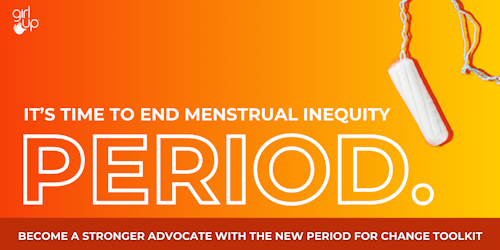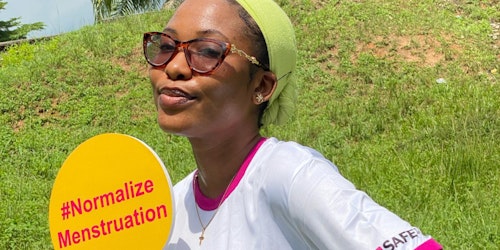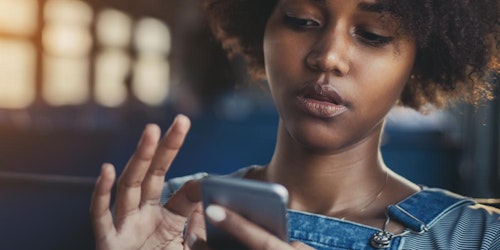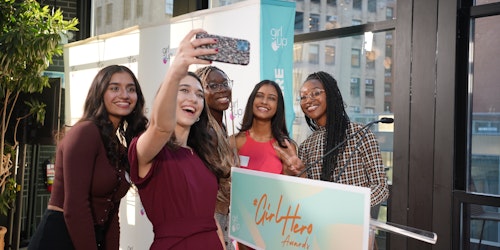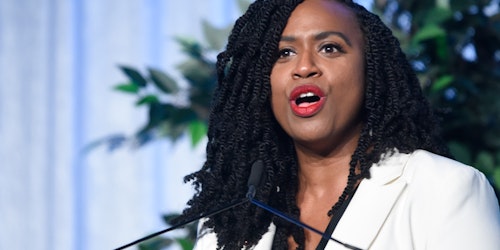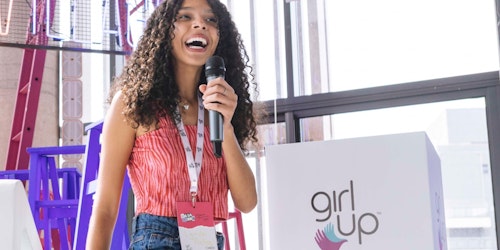To read this piece in Spanish, click here!
This piece was originally published on Aunt Flow.
Estimated reading time: 15 minutes
Platforms and stages to share stories and express advocacy do not always come around easily, but when they do, there is great power and responsibility in the words we decide to use. As a Regional Leader for Europe and Central Asia with Girl Up UN Foundation, I hope to continue using these opportunities to share collective narratives and drive awareness toward urgent discourse occurring around us. But before that, I am Sri Lankan; I am responsible for using my privilege and access to opportunities to guide people with me to the table. Period stigma took shape well before it even became a coined term and I hope to dismantle some of these biases.
What is Period Stigma?
Stigma has always been a feeling for me, undefined – just a pure state of emotion. These feelings of unease, discomfort and self-doubt around my period have been around long before I knew that there was one word defining it for me. But hey, that’s one girl’s opinion. Nonetheless, period stigma holds the shameful stereotype of menstruation being a concept of dirtiness in which its concept is tied by political, social, cultural and economic mindsets and beliefs. Hit a little too close to home? Well, allow me to go one further.
Why is it Important That We Address Period Stigma?
Simply put, not having these conversations is a major factor holding girls and women back. We have a responsibility as men, women and members of our communities to normalize these words and discussions. The thought of whispering ‘I’ve got my period’ when I was 13 to some of my girlfriends in school is something I wouldn’t wish on anyone else. Unfortunately, the world is not wired the same, and we hold a responsibility to address the stigma because cracking down on these stereotypes will allow girls and women to grow in a society from which they do not need to hide.
With Aunt Flow, I hope to explore not only the impact of period stigma and how, as Girl Up leaders, we hope to tackle it; more crucially, I hope to bring a few Girl Up leaders of color center-stage and bring their stories to light.

Understanding Period Stigma + Its Impact
Maria J.P., Girl Up Mexico
Maria J. P. from Girl Up Mexico shares her cultural narrative with period stigma and how it influences attitudes towards menstruation in Mexico:
“I am originally from Southern Mexico, in a small state called Tabasco on the border with Guatemala. Growing up in a small town made me realize how a conservative ecosystem can affect your health, especially if you are a girl. Menstruation was seen as a “problem” that girls had to deal with in silence. Taking out a sanitary pad or getting blood on yourself in class was cause for ridicule and shame. It was expected that, no matter how you felt physically, you would participate in extensive and demanding physical education activities. This is because teachers and students said that we as women have to “adapt” to an established system, even if it was not designed for us. The educational system was not designed to include menstrual health classes because it was perceived as something very “scandalous” for children. In a country where access to education is a privilege, obtaining menstrual and reproductive health courses was unthinkable. This meant that the girls most affected were those from rural and indigenous communities.
Growing up in that environment, one of the most important things for me was that the union between girls was always present. We were raised so that menstruating was a secret and synonymous with shame, but among girls, we always found our safe place.
Maria j.p.
In Mexico, one of the most important complications in accessing menstrual products was high prices, mainly for girls from local and low-income communities. Only in 2022 was the 16% tax law on menstrual hygiene products eliminated; however, this was only the first step to guaranteeing quality menstrual health for all women. Last year was historic for Mexican women due to the approval of two initiatives that seek to reform a federal law so that two days a month of pay are granted to working women and menstruating people who have disabling dysmenorrhea. These changes represent the results of years of struggle by the feminist movement. However, this did not prevent violent comments and ridicule from being generated by the opposition, mainly men, expressing that there should be no “preferences” towards women due to the issue of menstruation.”
Maria J. P., Youth Activist, Girl Up Mexico Leader, Founder of EduHer
Lavanya M., Girl Up UK
Lavanya M. from Girl Up UK shares her perspective on the social consequences of having periods and how period stigma in South Asia can affect relationships and interactions:
“In my South Asian upbringing, menstruation was surrounded by confusion. Culturally it was celebrated as a significant milestone when a girl had her first period. A grand party, similar to a wedding, was thrown in her honor, with extended family members and friends in attendance. However, once menstruation becomes a monthly occurrence, it is shrouded in secrecy. Girls are discouraged from discussing their discomfort or pain openly. Additionally, they are forbidden from participating in religious practices, perhaps stemming from the historical association of menstruation with impurity and dirtiness. These ingrained practices persist today, largely unquestioned. However, through education, our beliefs have evolved, yet some traditions endure. This is exactly why I think we need to continue to have open conversations about menstruation. These conversations spark awareness, foster empathy, dismantle stigma, and ultimately pave the way for meaningful change.”
Lavanya M., Co-Founder of Girl Up London, UK
Salma J., Girl Up Uk
Salma J. from Girl Up UK offers her insights into the economic implications when access to menstrual products and healthcare services is limited:
“The importance of access to period products is often overlooked due to the topic of ‘periods’ being a taboo. In many developing countries, they often lack the money to be able to afford period products and often would have to resort to unhygienic alternatives. In the UK itself, due to the cost of living crisis, it was reported that 63% of women are already unable to afford the products they require to manage their periods (bloody good periods). This is a problem as alternatives and lack of hygiene would increase the chance of getting infections, which can be very dangerous and present many complications to women and girls. Access to period products should be part of our rights as a human being, yet many women are unable to get access to it due to these economic barriers. Since it’s considered taboo to talk about our periods, many women and girls are also not able to voice this concern or address the problem, which would lead to most of them having to struggle silently. Going forward, for us to progress, I believe the topic of periods should be destigmatised and should be open to conversation to address these economic barriers so no woman or girl has to silently struggle with it.”
Salma J., Co-Founder of Girl Up London, UK
Breaking the Silence: Initiatives + Movements
Efforts to address, manage, reduce and end period stigma is a constant but determined battle. From community fundraising to national awareness to global advocacy, people around the world, representing different demographics, are leading and paving the way towards ending period stigma. Within these efforts are Girl Up youth leaders taking initiatives to help provide more equitable access to period products, providing platforms to share stories and fundraise.
Tehani C.P., Girl Up New England
Tehani C. P. from Girl Up New England shares her experiences towards addressing period stigma and her journey in advocacy:
“From Sri Lanka to the New England region, my journey with Girl Up has been fueled by a desire to empower girls and shatter the silence surrounding period stigma. As a woman of color, I understand the cultural and economic barriers that exacerbate this issue, both in my home country and across the globe. In Sri Lanka, where I volunteered with Zonta and Interact, I witnessed firsthand the impact of period shame. Through the “Butterfly Effect Project,” we tackled mental health awareness and integrated sex education, breaking down taboos and providing crucial information. Additionally, at “Better Me More,” a girls’ empowerment event, I helped organize and raise funds for sanitary napkins for female patients at the National Institute of Mental Health.
Joining the Girl Up New England Coalition opened new avenues for advocacy. Witnessing the passing of the “I AM BILL,” which combats period poverty in Massachusetts, was a powerful demonstration of youth-led change. The MA Senate passing this was a historic marker for Massachusetts feminist policy. Our current focus on destigmatizing periods resonated deeply, and it has been exciting to contribute to this crucial conversation. However, it is important to understand that our fight doesn’t stop at regional borders. The plight of women and girls in Gaza, where access to menstrual hygiene products is severely limited, deeply moved me. Therefore, this year’s Summit on Menstrual Equity has chosen to fundraise for this community, which I am so proud of.
This year, I’m contributing to the Girl Up Leadership Summit, collaborating on a presentation on legislative advocacy for menstrual equity. We even secured a speaker to share insights on the “I AM BILL,” showcasing the impact of local action on a global stage.”
Girl Up provides a global platform to amplify our voices and challenge discriminatory norms. Together, we are raising awareness, advocating for policy changes, and supporting initiatives that provide access to menstrual hygiene products. We are creating a world where girls can menstruate with dignity, regardless of their background or circumstances. This is not just about periods; it’s about equality, inclusion, and ensuring that every girl has the opportunity to reach her full potential. This is the fight we wage together, one period story at a time!
Tehani C.P.
Empowering Change
The empowerment of girls and women, in my opinion, has grown to define and redefine who we choose to be in a world that is constantly changing. This means mindsets need to change too, and it should start with us; if we think that we deserve to be treated equally despite the biases society carries towards women who have their periods, then I believe it will lead to a domino effect of others feeling the same way.
Conversations
Where and how do we even start to make change? Converse. If a conversation comes up; if words are exchanged; if people don’t have all the information; if people are asking questions – carry a conversation about it. Here’s an instance that’s happened to me: It’s been easy to get ticked off when people assume my moods or habits are swayed because ‘it’s that time of the month.’ Guess what? It definitely is like that for me. Right now, depending on the spaces I am in, I tell people ‘Hey, don’t worry about it’ or ‘Yeah day 2 of periods, nobody wants that’. I’ve learned that being more aware of my body, learning and listening to what it craves, and how it chooses to react is my responsibility. Part of that responsibility is to create a space where people can ask me questions if they don’t know, especially those who don’t get periods.

Education
Speaking of safe spaces, there is another crucial way to engage in these conversations, empower girls and women, and provide resources and support to those who face period stigma. Education. That is the core that wires and can rewire the way we think and approach almost anything in society. Launching educational tools including implementing the biology behind periods; why we get it; why it is important we get it; how it regulates our entire system; and the impacts it leaves on the people around us are topics that need to be researched, delivered and educated on. These tools can also include spaces where teens, young adults and adults in general can share their experiences with periods. These conversations hold links between how people connect with family, friends and society overall. How do you ask your peers at work if anyone has a spare pad without whispering? How does a daughter ask her father if he could lend her some money to go out and buy tampons? These are bonds that are redefining every day and having open conversations about periods breaks the stigma. It normalizes the conversations and education has a heavy role to play in this empowerment.
Additionally, the sole purpose of ‘education’ is longevity. It goes beyond textbook learning and into actual practice. How do we use period products? What foods will help us? Can we be physically active during our periods? These are vital topics to educate everyone on, beyond the young girls and women who have their periods. As of 2023. 1 in 10 African girls missed school during their menstrual cycle, which amounted to roughly 20% of the school year while in India, 66% of girls in rural areas were unaware of menstrual hygiene practices, and only 32% used sanitary pads. There are trickle-down effects of not having enough information as well as misinformation that we do not see the consequences of until it is too late. We all, collectively, have a responsibility to mobilize the right information to ensure that girls are equipped with what is required in order to allow them to flourish in a period-stigmatized society.
Increased Access to Menstrual Products + Resources
Here’s another avenue we could try… PROVIDE FREE ACCESS TO MENSTRUAL PRODUCTS AND RESOURCES. Who would have thought right? When we study regions in developing countries, it is prevalent that the inability to afford period products, let alone simply having the resources to manufacture these products, is limiting girls and women. According to UNICEF, 2023 saw only 27% of girls in low-income countries have access to menstrual hygiene materials. Economic barriers play a detrimental role with regards to deciding who is allowed to afford these necessities and it is, to this day, playing a life-threatening role for many girls and women.
As of recent years, it’s estimated that menstrual hygiene products can cost up to 10-15% of a girl’s monthly income in sub-Saharan Africa, and similar outcomes are experienced in regions including LATAM, MENA, Africa and Asia. Providing free access to these products, again, would create a similar positive domino effect. Young girls and women would be able to attend school and work; they would learn and earn; they would be able to go on to receive further education, make investments, and make more independent choices. These sound very accessible for some of us but almost unreachable for others. The stigmatization of periods is limiting girls and women in ways that are invisible to the naked eye and will not be felt until the future is in front of us. We have a collective responsibility to choose and take action which will redefine this notion.
Making a Difference
It needs to be mentioned that the most seismic change can only happen through a change in political views, policy changes and practices. Politics has a large part to play in the narrative of period stigma and the accessibility to products: this is when we will see a universal difference. But many of us do not and will not wait for change to come, we will be a part of that change. So how do we make a difference? Start small, trust me, it will amount to bigger impacts with patience in trusting the process. Start clubs and societies at schools and colleges – ignite those conversations! Run a movie night, a bake sale, a networking event and raise money to buy products and make donations! Reach out to NGOs and charities who you could volunteer with. Try shadowing a few people who are working more closely within the field and do not be afraid to ask questions. Surround yourself with people who are excelling in the field and are making ground-breaking impacts in advocacy and awareness – try to study what’s grabbing people’s attention and understand what’s moving the crowd. This field needs us to be loud and confident, use your powers!
How to Get Involved With Girl Up in Your Community

How can you more actively engage with Girl Up? Circle back to the region you are in because Girl Up is represented in regions including the USA, UK, LATAM, Africa, MENA, South Asia and Oceania. Find out what the teams are doing in your country and city; reach out to them and ask how you could get involved; attend their online and in-person events and network! This way, you’d be better able to understand the goals for the region and how you would best implement yourself in the global Girl Up community!
Continue to get to know people, grow yourself and who you are, and unlock your skills. The field of advocacy requires you to continuously step out of your comfort zone and be loud and proud in a crowd of people whom you do not always know. Bring yourself to the table, and I promise you will find your tribe.
The views and opinions expressed in this blog are the writer’s own.
Zayna Z. is one of Girl Up’s Regional Leaders for Europe and Central Asia. Her goals focus on creating opportunities and access to resources for girls, helping them forge friendships, and fostering community growth. Looking ahead, her long-term vision extends to expanding Girl Up’s impact across Europe and Central Asia, strengthening the Girl Up global community, and raising awareness about the critical importance of gender equality. Simultaneously, she contributes to Care About Climate (CAC) with the COP training team in which she collaborates with colleagues to develop an accessible educational program for youth, especially in the Global South.
